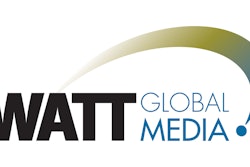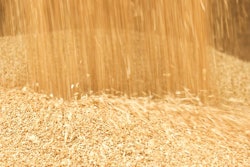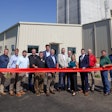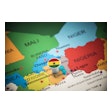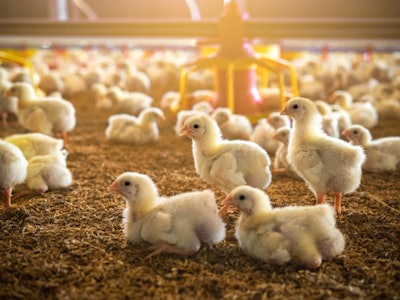
McDonald’s director of quality systems discusses the company’s move toward sustainable animal protein sourcing and how chicken feed factors into its sustainability goals.
In 2018, McDonald’s assembled an independent global Chicken Sustainability Advisory Council, comprising experts in genetics, leading academics and NGOs to guide its short- and long-term sustainability goals. Today, the company is making strides toward ensuring sustainability practices in its sourcing partners and its meat and egg supply chain.
Improving and examining chicken feed’s impact will play an important part in McDonald’s meeting its sustainability targets.
Recently, Ernie Meier, McDonald’s director of quality systems for U.S. supply chain management, joined the Chat to discuss the company’s plans and feed’s part in its mission.
Transcription of Feed Strategy Chat with Ernie Meier, McDonald’s director of quality systems for U.S. supply chain management
Jackie Roembke, editor, Feed Strategy: Hi, everyone. Welcome to Feed Strategy Chat. I’m your host, Jackie Roembke, editor of Feed Strategy magazine.
This edition of Feed Strategy Chat is brought to you by WATT Global Media and FeedStrategy.com. FeedStrategy.com is your source for the latest news and leading-edge analysis of the global animal feed industry.
Today we’re joined on Zoom by Ernie Meier, McDonald’s director of quality systems for U.S. supply chain management. He’s here to discuss feed’s role in McDonald’s long-term sustainability goals. Hi, Ernie. How are you doing?
Ernie Meier, McDonald’s director of quality systems for U.S. supply chain management: Well. Jackie, how are you?
Roembke: I’m doing great. Thank you. So briefly, can you tell me a little bit about the U.S. Roundtable for Sustainable Poultry and Eggs, and how it can help the industry improve sustainability throughout the supply chain?
Meier: Sure, the U.S. Roundtable for Sustainable Poultry and Eggs is a multi-stakeholder engagement group that has put together a framework that will help equip the entire value chain to better communicate with its stakeholders about the overall sustainability of U.S. poultry, and create a clearer picture of how these products are produced.
We believe that sustainability success starts with measurement and is improved by investing in the work that improves sustainability for our poultry, our planet and people. That is why we are in the final stages of developing our framework, which is the first ever multi-stakeholder sustainability reporting tool for the full U.S. supply chain for chicken, turkey and eggs from producer to final customer.
With the U.S. Roundtable for Sustainable Poultry and Eggs framework metrics, organizations will be able to provide a resource that helps them to report on their sustainability programs and build plans to improve those raising birds and work side by side with the supply chain and environmental groups, who have specific expertise in sustainability programs. This dynamic allowed the framework to be meaningful to the people implementing it and relevant to those who want to know more about how their food is being raised.
Register for the 2021 Chicken Marketing Summit: https://bit.ly/3frqLvb
Roembke: Great. Will you please describe how chicken feed factors into McDonald’s short- and long-term sustainability goals?
Meier: Sure, McDonald’s is the first global restaurant company to set science-based targets for greenhouse gas reductions in order to meet our 2030 climate target. For reduction, we mapped out our intensity in our supply chain. From there, we identified the top contributors, which are beef, chicken, dairy and cheese. So we took each one of those and mapped those supply chains and identified the top greenhouse gas contributors for each.
So, for example, in our poultry supply chain, feed accounts for approximately 70% of our greenhouse gas emissions. That’s our obvious area focus at this time.
Roembke: What is McDonald’s No. 1 continuous improvement goal for its feeding programs?
Meier: So we see agriculture as a climate solution, not a climate problem. And we’re working with our suppliers to help farmers, producers and ranchers adopt climate-smart agricultural practices, such as no-till planting, incorporating cover crops and the use of precision fertilizer applications. This will lead to a more resilient supply chain, improving soil health, increasing farmer economic outcomes and sequestering carbon.
The increased soil health will allow for farmers to better handle harsh weather conditions, both flooding and droughts. And later this year, we’ll be releasing an RFP to help identify agricultural engagement projects and collaboration opportunities to help further this work.
Roembke: Does McDonald’s have any plans to communicate these changes and improvements to the consumer?
Meier: At this time, there are no plans to communicate this work directly to our customers. But when the time is right, we will certainly do so.
Roembke: Excellent. Thank you so much, Ernie. To hear more from Ernie and other leaders in the chicken marketing and sales space, consider attending the 2021 Chicken Marketing Summit, held July 18-20 in Amelia Island, Florida. For more information about this event, visit www.wattglobalmedia.com/chickenmarketingsummit. Thank you so much, Ernie, and thanks to you for tuning in.


